An interview with Giosuè and Simone
How would you explain the concept of the metaverse to your grandmother?
GIOSUÈ – Like a movie. I would tell her to close her eyes and think of herself right inside the TV box showing the movie. The advantage over the movie, however, is that this time she will be able to perform interactive actions: she will be able to walk, interact with actors, buy products, participate in conversations, and much more. All of this by means of visors (like glasses), which immerse her in this dimension, and joysticks, remote controls, with which she can actually perform those interactive actions mentioned before – shopping, conversations, participation in events…
If my grandmother had ever seen a video game, I would tell her to think of herself as the character I play with the joysticks, i.e. the remote control. What I do is move within a reconstructed world, where I meet other characters, enter houses, forests, eat virtual food, and wear clothes that I can change… Well, the metaverse allows this, but in an enhanced manner. While the video game is played within the TV frame, with the visors (glasses) in the metaverse the user will be able to turn 360° and see an entirely immersive world. There are metaverses that are even attempting to introduce smells, tastes and the senses, which the most common technologies simply lack.
I also believe that many grandmothers use video calls to see their children and grandchildren around the world. One of the limitations of these calls is that often, in order to see what is going on around the family members, it is necessary to turn the camera, rotate the mobile phone, and move around the room; with immersive realities, these operations are minimised and one can enjoy a round, panoramic, multisensory and immersive experience.
From the armchair at home, from the bed or from the wheelchair, these grandmothers (and not only!) will be able to take many journeys. It started with phone calls, then video calls, and who knows, maybe one day the metaverse will be the most used mode. I don’t think it will take long, in the meantime: buckle up!
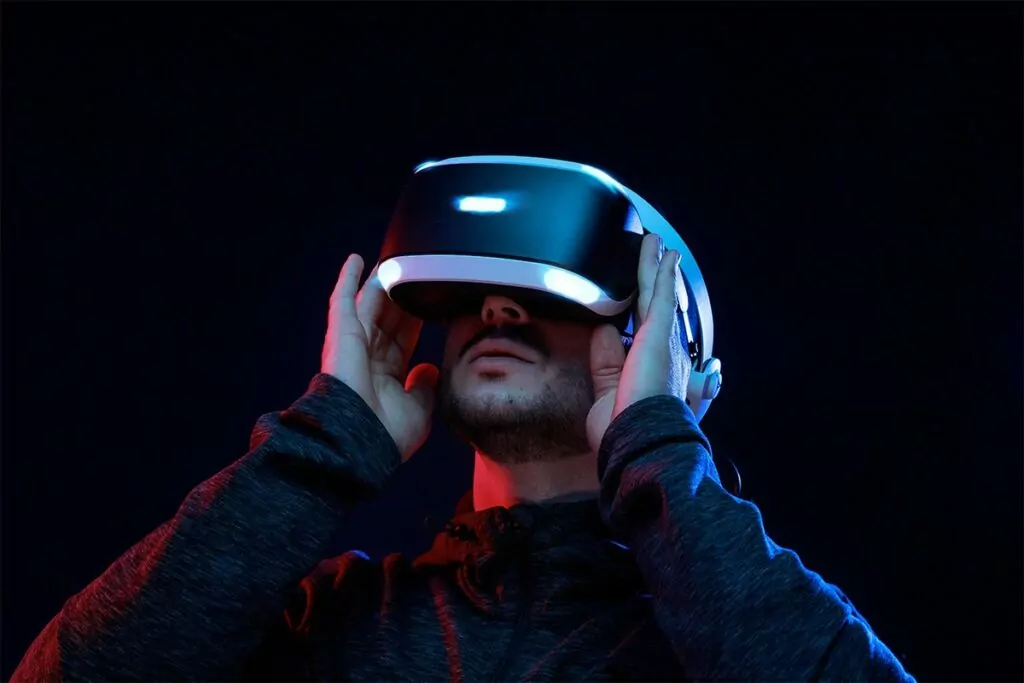
SIMONE – If I had to explain the concept of the Metaverse to my grandmother, I would tell her that whenever we find ourselves interacting with something that is not only physical, we are in the Metaverse. People often associate the Metaverse with virtual reality, but this is only one aspect. One can speak of the Metaverse as the Extended Reality or, for a more academic definition, one can say that the Extended Reality is the gateway to the Metaverse. It can be anything from digital overlays in the physical world, like a simple Snapchat filter, to VR experiences or mixed reality games like Pokémon GO. To simplify, all technologically enhanced realities are, in fact, the Metaverse. Another way to understand the Metaverse is simply to see it as the next
evolutionary step of the Internet. The term may have been introduced for marketing purposes, but the technology behind the Metaverse is not necessarily innovative and will probably follow the same path as other past trends.
Let us use the analogy with the World Wide Web. Remember the 90s? Accessing the Internet then required a pro-active effort, like disconnecting the telephone line and connecting to a noisy 56k modem… With the spread of wearable devices, IoT and constant connectivity via smartphones, we are now always connected and no longer have to actively “enter” the Internet. The Metaverse will probably follow this trend and become an integral part of our daily lives, like our refrigerator or washing machine, without even having to think about accessing it. So, grandma: we will be in the Metaverse when we no longer think of the Metaverse….
What will be the greatest benefits of the metaverse for the public?
GIOSUÈ – As I mentioned in the previous question, we usually think of travel as something ordinary, predictable, almost natural. Yet, this is not the case. “Travelling” is not so democratic. It may be expensive, tiring, debilitating, or unthinkable for some people.
The metaverse can be used from home, from the wheelchair, from the remotest of municipalities and geographies; by now you know the necessary equipment: visors, joysticks and an internet connection. Not that this is affordable for everyone, but the speed with which these tools fall into out-datedness is such that the costs come down quickly.
Precisely because of its limited requirements, the metaverse is used in a variety of fields. There are universities that, for instance, hold dual lectures (in the classroom and in the metaverse), allowing students who do not live in the city to cut down on rent and relocation costs and enjoy an immersive, yet home-based lecture. This means that anyone, from anywhere, can attend (even) the best universities in the world, from home, thus cutting costs considerably.
Therefore, from tourism to education, rentals, transport and the environment, the metaverse presents itself as an interesting – and certainly improvable – opportunity for different fields, knowledge and industries.
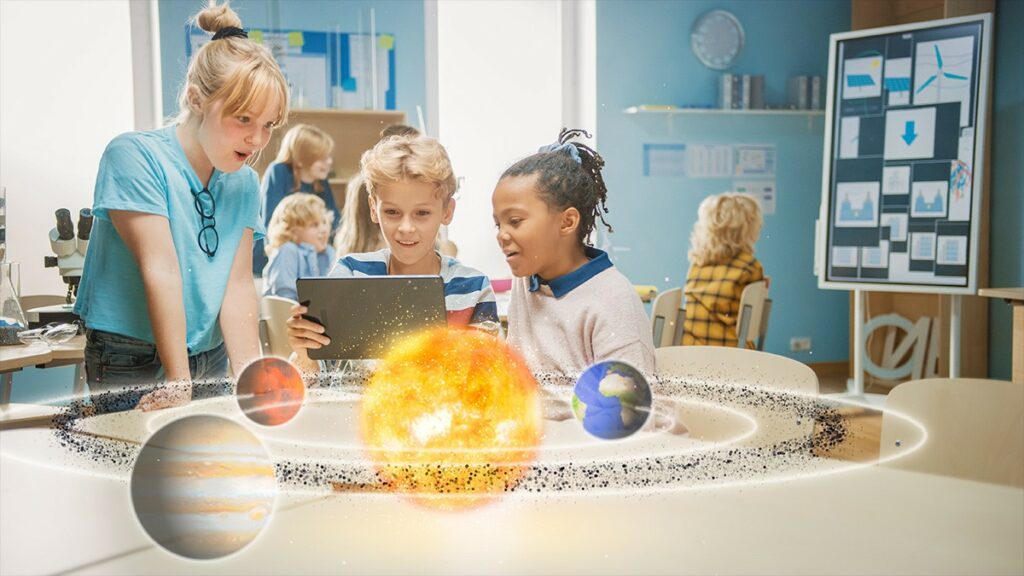
SIMONE – This is an interesting question. We are already seeing the benefits of the so-called “Industrial Metaverse” in various sectors, including R&D, healthcare and automotive industry. I like to categorise the Metaverse into two types: self-referential and instrumental. The self-referential Metaverse refers to those use cases where the Metaverse is the ultimate goal rather than just a means to achieve it. For example, when playing a video game like Call of Duty, the experience and all related economic activities begin and end within the game. However, if we see the Metaverse as a tool or a medium, its potential becomes even more interesting. Simply put, the Metaverse can bring value if and when it solves real IRL problems. An example of the virtuous use of the Metaverse that I recently encountered comes from Italy, so I am
particularly proud of it. Fourteen young patients at the Santobono Hospital in Naples were able to watch the Champions League final between Real Madrid and Liverpool through VR visors, feeling as if they were watching the match from the perspective of the players at the Stade de France stadium in Paris instead of from a hospital room. This was a brilliant social use of VR technology in a hospital setting, to make children smile and offer them a unique and memorable experience.
How long will it take this new high-tech frontier to become an integral part of our daily lives?
GIOSUÈ – In October 2021, Marck Zuckerberg announced that his group – which besides Facebook also includes Instagram and Whatsapp – would be called “Meta” – short for meta-verse. The announcement was followed by a video, which shows just how the technologies we are used to using – Whatsapp, Instagram and primarily Facebook – are intended to evolve and become immersive. Therefore, there are plans for our Facebook profiles to soon have an avatar – already many have created one by themselves – that will enter a world with services, activities, and events.
Although there are no already concrete and executive cases of this process of “meta-versalisation,” in some way, all of us are already actors in the waiting queue.
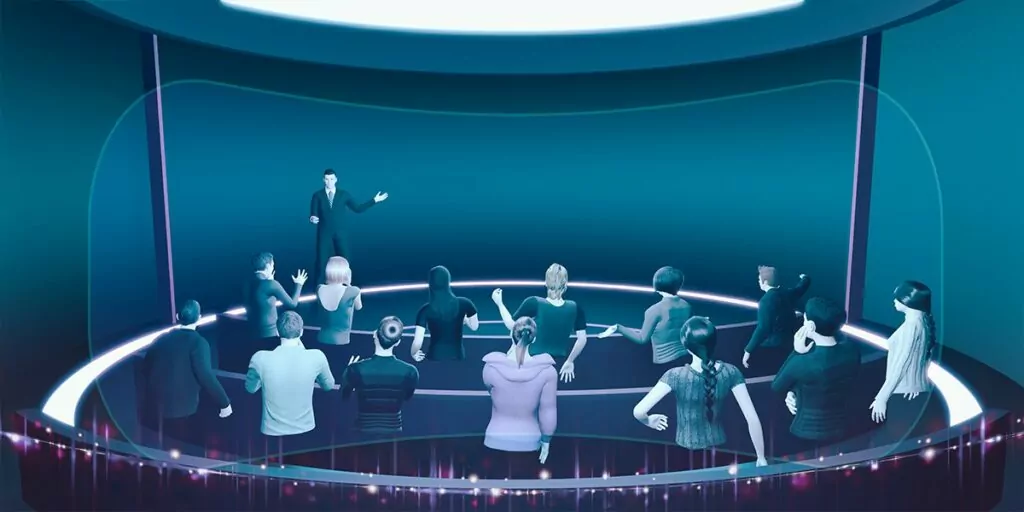
SIMONE – The answer is not clear-cut. Technologically speaking, we are getting there. However, we may still be a few decades away in terms of widespread techno-acceptance. Have you ever read anything by Douglas Adams? Besides being the author of the hilarious Hitchhiker’s Guide to the Galaxy, he was a great advocate of innovation. In a 1999 essay entitled “How to Stop Worrying and Learn to Love the Internet“, published in the Sunday Times, Adams outlined some guidelines for our relationship with technology. He believed that anything that exists when one is born is considered normal, anything invented between the ages of 15 and 35 is seen as innovative and exciting and anything invented after the age of 35 is, well… unnatural! Do the math… For many people, the Metaverse might seem unusual and unnatural. However, having an open and receptive attitude towards technology is crucial if you do not want to be left behind.
Which points will we have to pay attention to?
GIOSUÈ – There have been situations in which avatars have carried out acts of violence and forcible touching towards other users… This may sound comical and perhaps surreal when put like that, but let us not forget that behind those avatars there is always a human being, and therefore victims and executioners. It is the same as with social media and the famous “keyboard lions” – it is true that we do not see them physically, but we still perceive their malicious intentions to insult us, expose us, and denigrate us publicly… Therefore,
it will be necessary for the postal police, our legislators and the digital communities themselves to denounce, report, formalise and control these worlds, which as such need rules, vigilance, ethics, deontology and social responsibility.
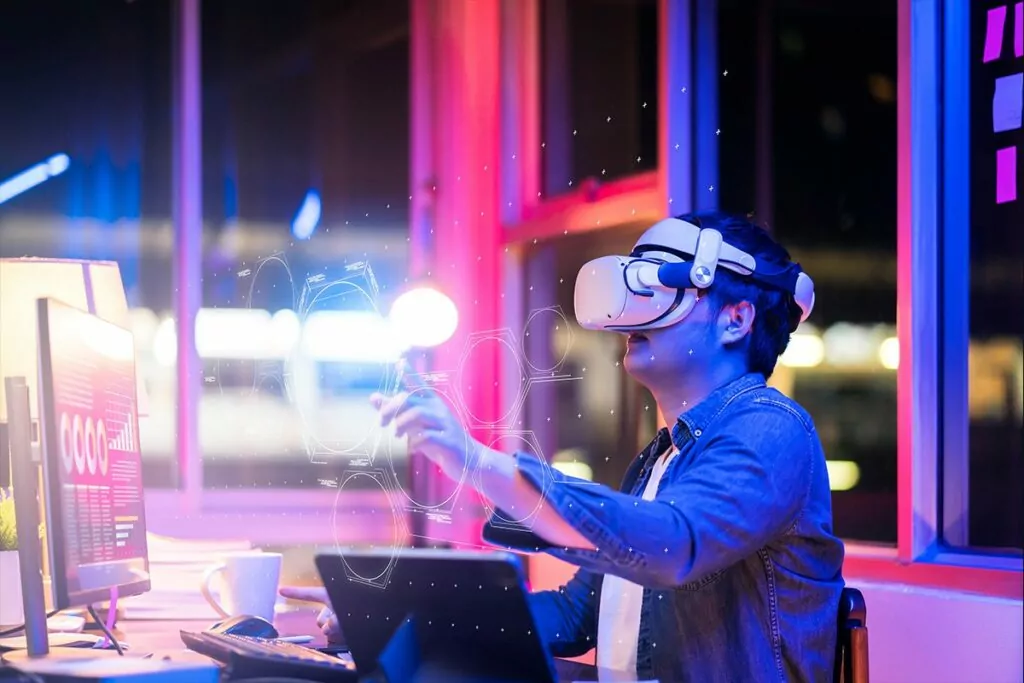
SIMONE – Interoperability, no doubt. This is certainly a crucial aspect of the development of the Metaverse. Without it, investing in a particular metaversal platform may lead to disappointment, as there is a risk that it will become obsolete within a few years. To achieve a decentralised, open and cohesive Metaverse, it is crucial to ensure that digital assets, such as 3D environments, avatars, NFTs, terrains, avatar skins and other elements, can be seamlessly transferred between platforms.
This means, for example, playing a game, earning a digital good, selling it on a secondary market, receiving payment in crypto currency, buying an avatar skin in another game and wearing it in any virtual world one wishes. This interoperability is the very essence of decentralisation and the foundation of Web 3.0. Although we still have a long way to go before we reach this level of interoperability, it is a crucial step towards the development of the Metaverse.
What will not be replaced by the metaverse in our real world?
GIOSUÈ – I assure you that the metaverse will make us more and more passionate about our beloved (?) humanity. Those immersive sessions, gradually increasing in performance, efficiency and evolution, will entail, in addition to the many hours spent in those worlds, a parallel sense of saturation, claustrophobia and need for oxygenation, which we already experience when we enter other immersive dimensions; think about zoom calls, the hours spent in front of a video game, or simply in front of the TV. When we realise that we have spent hours in front of those screens, we long for fresh air, a walk, a real chat at the bar. Well, I believe that the metaverse will make that second phase more and more unique and rare, to the point where I believe “detox days“, i.e. technology detox days, will be instituted. So probably more metaverse, but also more humanity!

SIMONE – I just can’t think of anything… Most people seem to perceive reality as a binary concept, with the distinction between what is real and what is not. However, it is important to recognise that this perspective is limited and may soon become obsolete. In his book “Reality+”, the techno-philosopher David Chalmers proposes a new way of understanding reality, in which extended reality is considered as real as physical reality.
With technology progress, Chalmers predicts that the Metaverse will soon become so indistinguishable from our physical world that even trying to distinguish between the two will become meaningless. I call it the “Roblox Effect“: for my son, playing with an avatar in a virtual world 1,000 km away or with a friend in the physical world makes no difference. The boundaries between perceivable reality and virtual reality will blur and the distinction between the digital and physical worlds will be erased sooner than we think or want…
What are the major benefits of the metaverse within ART/ TOURISM?
GIOSUÈ – We’ve talked about this before, but I’ll give a few more concrete examples to understand this technology even better. A few months ago, the Ministry of Foreign Affairs of the state of Tuvalu, an archipelago in the Pacific Ocean, sent out a very strong message: during COP27, the international event to coordinate on the current and future environmental challenges, this politician, Simon Kofe, decided to deliver his speech from the ocean, pulling up his trousers to make visible the rising waters due to climate change.
In addition to this, Kofe announced that the entire state would be digitised (precisely mapped and digitised in its geography) and released into the metaverse. Because of the potential disappearance of the country, in fact, this technique, although contestable, will always make it possible to “visit” it. Thus, future citizens of Tuvalu will always be able to enjoy their country, the way it was, the way it looked… Although the case seems strange to us, imagine Italy: 7500 kilometres of coastline also threatened by these dangers. While the metaverse cannot save these “Atlantis-like” places of the world, it certainly provides a side solution, one of recovery and preservation.
SIMONE – There are many of them, actually! The Metaverse has several benefits for the tourism industry, such as enhancing direct booking experiences in virtual worlds with seamless graphical user interfaces, promoting urgency to purchase, providing immersive MICE experiences,attracting younger audiences through gamification, increasing direct sales, community engagement, AR overlays on historical real-world destinations, targeted advertising through data collection, overcoming the limitations of Web 2.0, DAOs, native advertising, travel experiences for those with mobility limitations, interactive staff training, improved levels of privacy through blockchain, and sustainable alternatives to mass travel, to name a few.
The Metaverse’s impact on tourism is evolutionary rather than revolutionary. It will not completely replace the journey, but it will undoubtedly play a role, especially in the early stages of the traveller’s journey. Currently, we choose hotels based on photos, videos and reviews, but the Metaverse has the potential to provide a more immersive experience. We could get a “taste” of a destination and book a hotel room or a table in a restaurant, all from the comfort of our own home. This can be considered an advanced form of “try before you buy”. We are only beginning to discover what the Metaverse has to offer, and the potential of its impact on tourism is huge.

GIOSUÈ PREZIOSO
Giosuè Prezioso is a professor and researcher with international experience and currently Director of Studies at the Unicollege University of Turin – the youngest Academic Director in Italy. After his studies in America, he specialised at Christie’s – the world’s leading auction house – and then continued with a doctorate and postgraduate studies at the University of Reading and Harvard University’s Graduate School.
As a professor, Giosuè has lectured at prestigious international institutions, including the American University of Florence, the Universidad Rey Juan Carlos in Madrid, the Chamber of Deputies and John Cabot University.
He is the first lecturer in Italy to have imported crypto art into an academic context, and among the first researchers to have published articles, television interviews and industry reports on the subject. As a professor for the University of Bari, he was also the author of the launch of the first NFT library and auction in an academic context, as well as of the university within the metaverse – achieving reviews in Forbes, The Cryptonomist, Arizone State University and RAI, among others.
He is currently publishing a book with the prestigious Cambridge Scholars Publishing, where, as an author, he brings together some of the world’s leading figures of the contemporary art-tech scene.

SIMONE PUORTO
Simone Puorto is a visionary consultant and speaker with 25 years of experience in the industry.
He is a multi-published author and was crucial in organising the first travel and hospitality event in the metaverse, Polybius.
Simone is a sought-after MBA lecturer, and has taught at esteemed institutions such as ESSEC, Les Roches, 24Ore BS, University of Parma, Ca’ Foscari, Swiss Hotel Management School and IMHI.
He is a member of the advisory board of several leading companies, including BWG, RobosizeME, Vision, TelltheHotel, E23 Delivery, GAIN and PlayHotel.
As Metaverse Evangelist for Olimaint and Hospitality Net, Simone is dedicated to exploring the future of travel and hospitality. He is also the founder of the renowned consultancy firm Travel Singularity, based in Rome and Paris.
Simone is passionate about shaping the future of travel through innovative and sustainable solutions.
GAME ROOM – Bivillage
The BiVillage in Fažana, in Croatia, offers plenty of outdoor activities that can be enjoyed with the whole family, but since last year, there is something new for all those who love video games and wish to approach the metaverse: a new gaming room.
In the Meta Z game room, you will find the latest gaming equipment, including Playstation 5, gaming PCs, VR and accessories, to enjoy games of all kinds and difficulty.
The game room is open daily from 11:00 AM to 11:00 PM by prior reservation and has 55″ and 75″ 4K screens available.
There are a lot of activities you can do inside: from participating in the many organised tournaments, to challenging your friends, or you can play or experience the thrill of virtual reality individually.
The BiVillage is the dream destination for sea lovers who don’t want to give up their passions even on holiday. You can challenge other guests staying at the village or make new friends in a cheerful and friendly atmosphere.
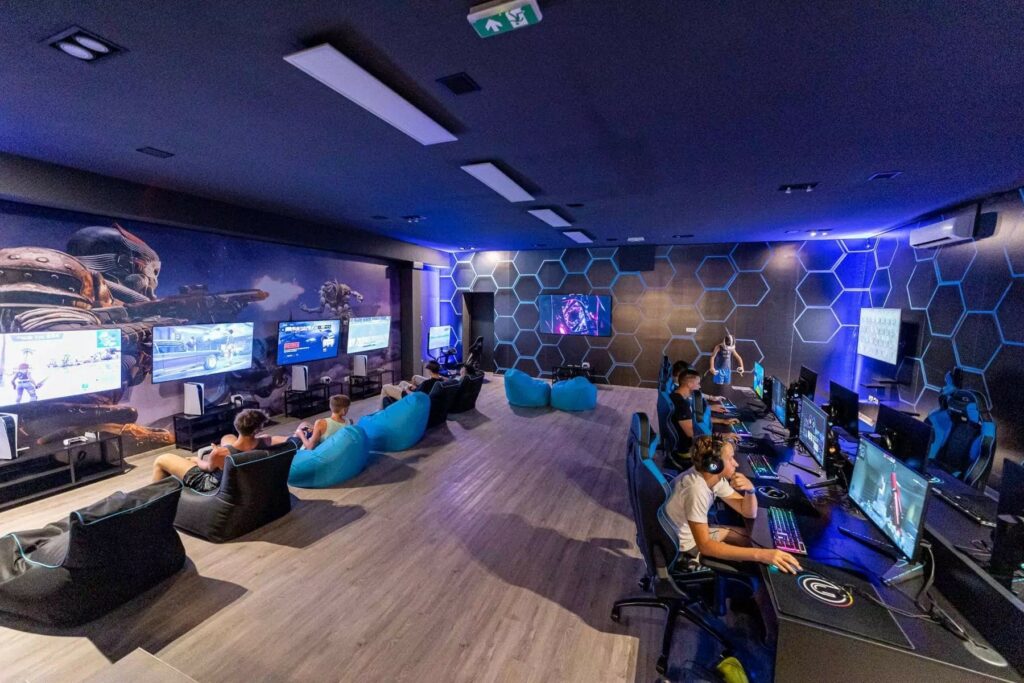

 Fasana, ISTRIA
Fasana, ISTRIA 

